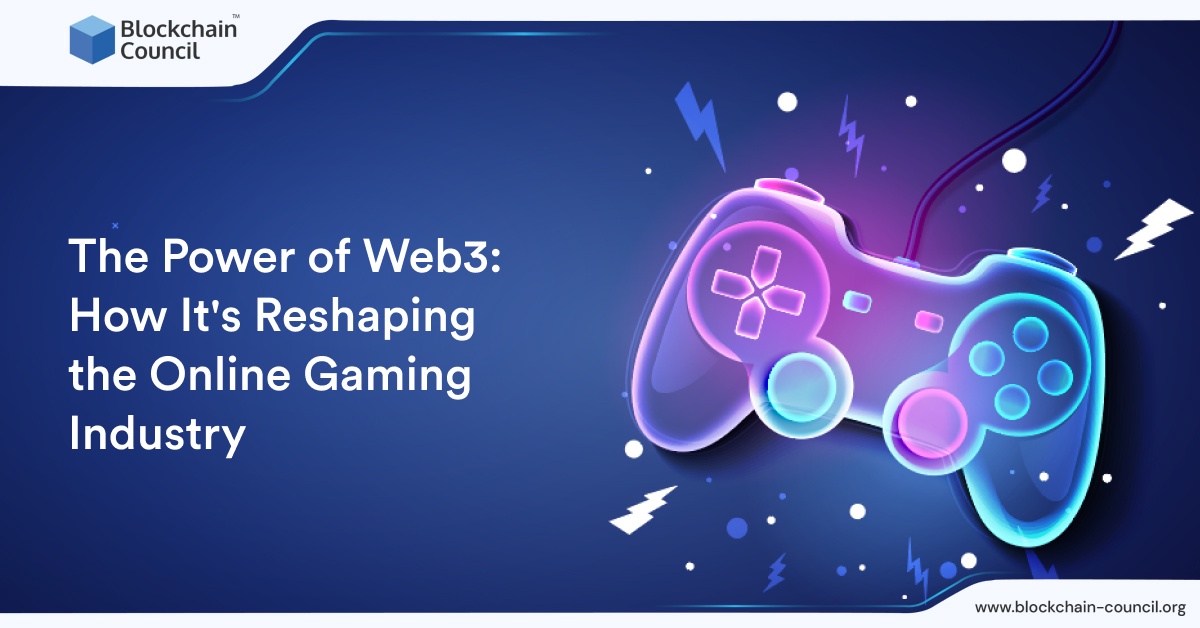The rapid advancement of technology has revolutionized the way we live, work, and play. In recent years, the emergence of Web3, a decentralized and blockchain-based internet, has gained significant attention across various industries. One sector that is experiencing a transformative impact from Web3 development is the online gaming industry. With its unique characteristics and capabilities, Web3 is reshaping the landscape of online gaming, offering new opportunities for gamers, developers, and investors alike.
To explore and understand the power of Web3, many institutions have started Web3 education programs. Freshers and even professionals can enroll in these programs and add extra skills to their names.
In the APAC region alone, the gaming industry revenue is projected to exceed $174 billion by 2021. In 2019, the APAC gaming market generated a revenue of $72.2 billion. These figures are expected to soar even higher as the focus shifts from traditional video games to blockchain-based games in the era of Web 3.0.
This article explores the power of Web3 and its profound influence on the online gaming industry.
Decentralization and Ownership
One of the key features of web3 development is decentralization, which removes the need for intermediaries and empowers individuals to have complete control and ownership over their digital assets. In the traditional gaming industry, players invest countless hours and money into acquiring in-game items, virtual currencies, and other digital assets, only to find themselves at the mercy of centralized game developers and publishers. However, with Web3, players can truly own their digital assets through the use of non-fungible tokens (NFTs) and blockchain technology. This ownership provides players with the freedom to trade, sell, or even create unique in-game items, fostering a new economy within the gaming ecosystem.
Play-to-Earn Model
Web3 brings forth a revolutionary concept known as the play-to-earn model. Traditionally, gamers would spend hours playing games without any financial reward. However, with the integration of blockchain technology, players can now earn real-world value for their in-game achievements. By participating in decentralized gaming platforms, players can earn cryptocurrency tokens, NFTs, or other valuable digital assets, creating a new paradigm where gaming becomes a viable source of income. This play-to-earn model not only incentivizes players to engage more deeply with games but also opens up opportunities for individuals from all walks of life to participate in the gaming industry.
Enhanced Security and Transparency
Web3's decentralized nature offers enhanced security and transparency, addressing long-standing issues within the online gaming industry. In centralized gaming platforms, players often face challenges such as fraud, cheating, and lack of transparency in-game mechanics. However, by leveraging blockchain technology, Web3 ensures transparent and immutable game rules, preventing cheating and fraud. Smart contracts enable fair play and automatically execute predefined rules, eliminating the need for intermediaries and reducing the risk of manipulation. Additionally, the decentralized nature of Web3 reduces the vulnerability to hacking, safeguarding players' personal information and digital assets.
Interoperability and Cross-Platform Integration
Web3's interoperability allows for the seamless integration of games across different platforms and ecosystems. Traditionally, games are confined to specific platforms or consoles, limiting players' experiences and interactions. According to Web3 experts, with Web3, games can be built on open protocols and connected through blockchain networks, enabling cross-platform play and interoperability. This interoperability not only enhances the gaming experience but also encourages collaboration between developers, fostering innovation and the creation of new gaming experiences.
Community Governance and Incentivization
Web3 empowers gamers and developers by offering community governance and incentivization mechanisms. Through decentralized autonomous organizations (DAOs), players and developers can actively participate in decision-making processes, such as game updates, features, and overall development. This gives the gaming community a voice and fosters a sense of ownership and engagement. Moreover, Web3 enables the creation of decentralized marketplaces, where players can trade, sell, or even lend their digital assets. These marketplaces provide economic incentives for both players and developers, driving innovation and fostering a vibrant gaming ecosystem.
Funding and Investment Opportunities
Web3 introduces new funding and investment opportunities within the gaming industry. With the rise of initial coin offerings (ICOs) and initial exchange offerings (IEOs), game developers can raise funds directly from the community, bypassing traditional fundraising channels. This allows for greater access to capital and democratizes the investment landscape, enabling individuals from around the world to participate in supporting promising gaming projects. Additionally, blockchain technology enables the fractional ownership of game assets through tokenization, allowing investors to diversify their portfolios and potentially benefit from the success of popular games.
Provenance and Scarcity of Virtual Assets
Web3 brings provable scarcity and provenance to virtual assets in the gaming industry. Through the use of NFTs, each virtual item or asset can be uniquely identified, authenticated, and tracked on the blockchain. This introduces a level of scarcity and rarity to digital assets, making them valuable and collectible. Gamers can now truly own rare and unique in-game items, providing them with a sense of exclusivity and bragging rights. Moreover, the ability to prove the origin and history of these assets enhances their value and trustworthiness, creating a thriving marketplace for collectors and enthusiasts.
Immersive Virtual Worlds and Metaverse
Web3 lays the foundation for the development of immersive virtual worlds and the metaverse. With the integration of blockchain technology, virtual worlds can be created where players can interact, own property, and engage in various activities across different games and experiences. These virtual worlds enable social connections, collaborative gameplay, and endless possibilities for creativity. Players can create and monetize their own content, participate in virtual economies, and explore interconnected universes. The metaverse represents a new frontier for the online gaming industry, blurring the lines between virtual and physical realities.
Elements Essential for the Gaming Industry's Transition
Blockchain technology plays a crucial role in the transition of the gaming industry to Web 3.0. With its decentralized and immutable nature, blockchain allows for the creation of gaming ecosystems where multiple games can coexist. This opens up new possibilities for gamers to interact and engage within a single blockchain-based system.
Non-fungible tokens (NFTs) have also emerged as a significant element in the transition. NFTs are unique digital assets that can be owned, traded, and used as in-game items. These tokens, stored on the blockchain, provide players with exclusive ownership over rare and valuable assets. Achieving high rankings or completing specific objectives within the game allows players to obtain these coveted NFTs, which can be transferred within the gaming platform.
Artificial Intelligence (AI) has been integrated into the gaming industry, enhancing game development and gameplay experiences. Through AI and natural language processing, computers can understand and process information similarly to humans. This enables the creation of dynamic and immersive game worlds driven by non-playable characters that exhibit human-like behaviors and responses. AI-powered games offer a more engaging and realistic gaming experience.
Tokens, the native currencies within gaming ecosystems, serve as incentives for players. By participating in games, players can earn tokens that hold value within the gaming community. As the value of these tokens increases, it motivates players to strive for greater achievements and encourages community engagement. Players can also purchase these tokens on the market, providing them with additional resources and opportunities within the gaming ecosystem.
These elements, blockchain, NFTs, AI, and tokens, collectively contribute to the transition of the gaming industry to Web 3.0. By leveraging these technologies, the gaming experience becomes more decentralized, immersive, and economically rewarding for players. The industry is witnessing a paradigm shift where players have greater control, ownership, and opportunities within the evolving landscape of online gaming.
Challenges and Considerations
While Web3 brings numerous advantages to the online gaming industry, there are also challenges and considerations to be addressed. The scalability and transaction costs of blockchain networks need to be improved to accommodate the high demands of gaming. User experience and interface design should be seamless and intuitive to attract mainstream adoption. Moreover, regulations and legal frameworks surrounding cryptocurrencies, NFTs, and virtual assets need to be established to ensure consumer protection and mitigate potential risks.
The Future of Web3 Gaming
The integration of Web3 into the online gaming industry is still in its early stages, but the potential for growth and innovation is immense. As blockchain technology continues to advance and scalability issues are addressed, we can expect to see more sophisticated gaming experiences, enhanced cross-platform integration, and increased adoption of the play-to-earn model. The metaverse will likely become a reality, where players can seamlessly navigate between virtual worlds, socialize, and participate in a diverse range of activities. Web3 gaming has the power to transform the way we perceive and engage with games, creating a more inclusive, transparent, and immersive gaming ecosystem.
Conclusion
Web3 is reshaping the online gaming industry by empowering players, developers, and investors with decentralized ownership, the play-to-earn model, enhanced security, and transparency. It enables cross-platform integration, community governance, and new funding opportunities. Web3 brings provenance and scarcity to virtual assets while paving the way for immersive virtual worlds and the metaverse.
Although challenges exist, the future of Web3 gaming holds tremendous potential for innovation, collaboration, and the creation of transformative gaming experiences. As the power of Web3 continues to unfold, the online gaming industry stands poised for a remarkable evolution.
If you are looking for Web3 certification courses, then check out Blockchain Council’s website. Blockchain Council offers some of the best certification programs that are extensively crafted according to the industry’s needs. These courses provide theoretical as well as practical knowledge and are pocket-friendly too. So, enroll in a course and begin your journey as a Web3 expert.


No comments yet